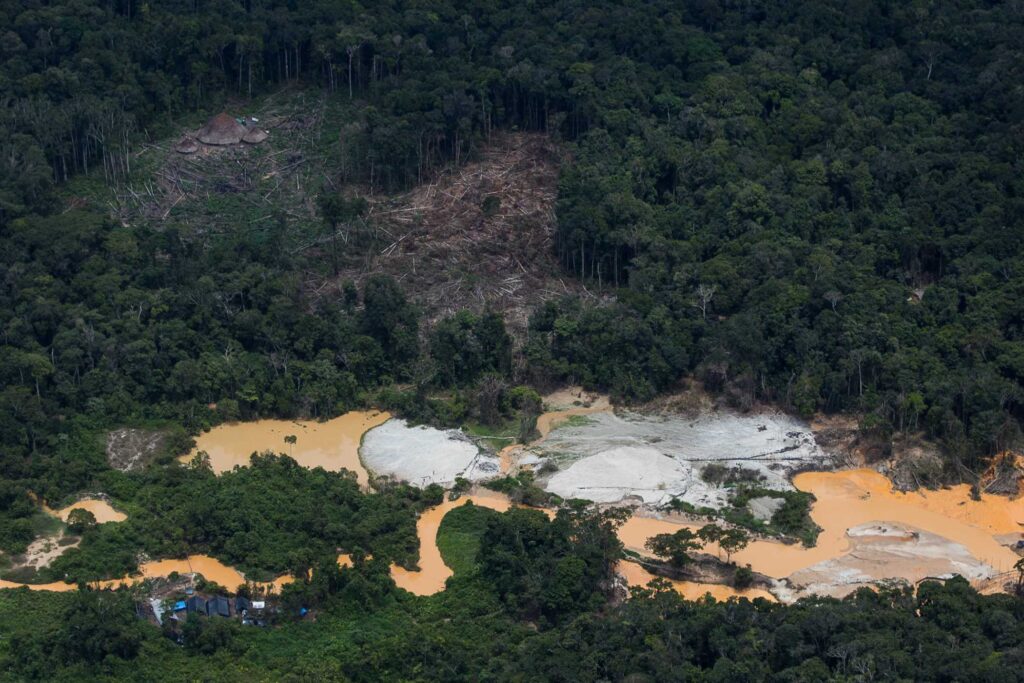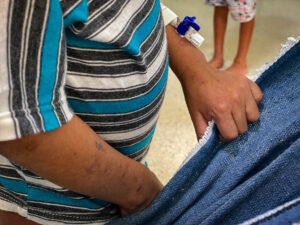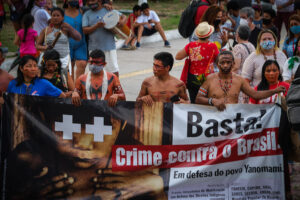IMAGE CREDIT: Fernando Frazão/Agência Brasil
- 308 deaths were recorded in Yanomami territory in 2023. The main causes of death include pneumonia, diarrhea, malaria, and malnutrition.
- Armed Forces distanced themselves from anti-mining operations and hindered Indigenous institutions’ response to the crisis.
- Lack of security is compounding the crisis in an area plagued by violence linked to illegal mining.
A year after declaring a public health emergency in the Yanomami territory in Roraima, Brazil, the world is once again shocked by images of Yanomami children in states of severe malnutrition. Immediately after taking office in early 2023, the Lula government showed a strong political will to address the humanitarian crisis faced by the Yanomami, which includes a surge in malaria, severe malnutrition, diarrhea, and pneumonia. However, the emergency plan that the administration put in place lasted only six months and was insufficient to address the situation. As a result, things have deteriorated to levels similar to those of 2022. At least 308 Yanomami people died from January to November 2023, half of them children under five, according to health officials. In 2022, before the emergency plan, 343 deaths were recorded.

Despite significant resource allocation and nearly 2,000 health professionals deployed, the government’s efforts have faltered. Health workers and Indigenous leaders, speaking to Sumaúma Journal, highlighted the ineffective use of the one billion reais (USD$243 million) investment due to critical management failures. These include disorganized management and lack of local knowledge among project leaders, minimal cooperation with experienced NGOs and regional experts, absence of consistent healthcare in communities, and logistical challenges in expelling illegal mining from certain areas.
Compounding the crisis is the lack of personal safety for workers, who find themselves deployed to areas plagued by illegal mining, sexual abuse, child prostitution, drug trafficking, and heavy weaponry. Brazil’s National Public Security Force has failed to ensure safety, resulting in suspended health missions and more Yanomami deaths, often unrecorded in official statistics. Reopened medical outposts face the threat of closure due to increasing criminal invasion.
“The situation is complicated as malaria continues, and we keep losing our children. This month, two died in [the community of] Õkiola.”
Mateus Sanöma, a Yanomami leader from the Awaris region, told Sumaúma, “The situation is complicated as malaria continues, and we keep losing our children. This month, two died in [the community of] Õkiola.” He emphasized that the highest number of deaths and diseases occur in communities lacking medical outposts and that are accessible only by helicopter—an infrastructural issue the government has proved unable to resolve. “Diarrhea and worm infections in children are increasing. It’s a major concern; my people are still suffering.”
The main causes of death include highly treatable illnesses. While official indicators show some improvements in the territory and the resumption of previously closed services, the explosion of malaria cases remains unresolved, with over 25,000 cases, and an average of 2,000 new cases per month. Malaria, spread by mosquitoes thriving in stagnant water from mining activities, is a debilitating disease that requires continuous medication by qualified healthcare teams for effective treatment. Without treatment, malaria can quickly turn fatal—even more so when the patient is already weakened by malnutrition or other afflictions.

Health professionals note that malnutrition among Yanomami children, coupled with other diseases, remains severe. However, extreme cases have decreased, with many conditions stabilizing upon hospital admission in Roraima’s capital.
Folha de S.Paulo newspaper highlighted the military’s absence in critical regions like Surucucu and Auaris, despite nearby military bases, and criticized the decrease in anti-mining enforcement. Additionally, the closure of a military-run fuel supply base in Palimiú has further hindered operations in more remote areas within Yanomami territory.
Even beyond Brazil’s Armed Forces distancing themselves from anti-mining operations, their actions have also hindered Indigenous institutions’ response to the crisis. The Air Force refused to authorize a monitoring flight by the Hutukara Yanomami Association to document the resurgence of illegal mining. This refusal highlights the military’s reluctance to control air traffic in the territory, where small aircraft continue to support illegal mining. In response to military inertia and public pressure, Brazil’s Ministry of Defense approved the use of the Armed Forces to distribute basic food supplies in Yanomami territory, a move spurred by President Lula’s demands. Meanwhile, the Federal Police’s investigations into the alleged genocide of the Yanomami—and potential crimes against humanity by Bolsonaro, his vice president Hamilton Mourao, and his government agents— have been stalled.
“It seems this will never end. Everywhere the miners bring in heavy machinery, the river gets destroyed. I hope the new operation starts this month and not next. It’s urgent.”
“The Lula administration wasn’t prepared. There should have been better organization to address the health crisis. It seems this will never end. Everywhere the miners bring in heavy machinery, the river gets destroyed. I hope the new operation starts this month and not next. It’s urgent,” said Davi Kopenawa to AFP news agency.
The federal government announced that it will spend 1.2 billion reais (USD$245 million) this year in security and aid efforts within the Yanomami territory. The plan includes establishing a local headquarters that aims to consolidate federal security efforts to fight “wildcat” gold mining, a significant problem in the region. Other measures include food distribution and a new health center that will focus on Indigenous peoples’ medical needs.
“It’s imperative and urgent that we pressure the Lula government to escalate humanitarian actions, addressing this dire situation that threatens the very survival of the Yanomami people.”

“Under Bolsonaro’s reign, unchecked mining expansion in the Yanomami Indigenous Territory unleashed a genocidal crisis, marked by famine and escalating violence. Now, it’s imperative and urgent that we pressure the Lula government to escalate humanitarian actions, addressing this dire situation that threatens the very survival of the Yanomami people. Rainforest Foundation US will be closely monitoring the developments of this crisis, and we remain committed to supporting and advocating for the urgent needs of the Yanomami”, said Christine Halvorson, Program Director of Rainforest Foundation US (RFUS).
During the COVID-19 humanitarian crisis, RFUS raised funds to aid several Indigenous groups, including the Yanomami. In 2020, in collaboration with various NGOs, RFUS supported the ‘Miners Out, Covid Out‘ campaign,’ calling on the Brazilian government to expel illegal miners from the region. Locally, RFUS has partnered for more than 20 years with the Indigenous Council of Roraima (CIR – Conselho Indígena de Roraima) in Brazil. As one of the country’s largest Indigenous organizations, CIR has been defending Indigenous peoples’ rights and promoting the autonomy of Indigenous peoples for over 50 years.



